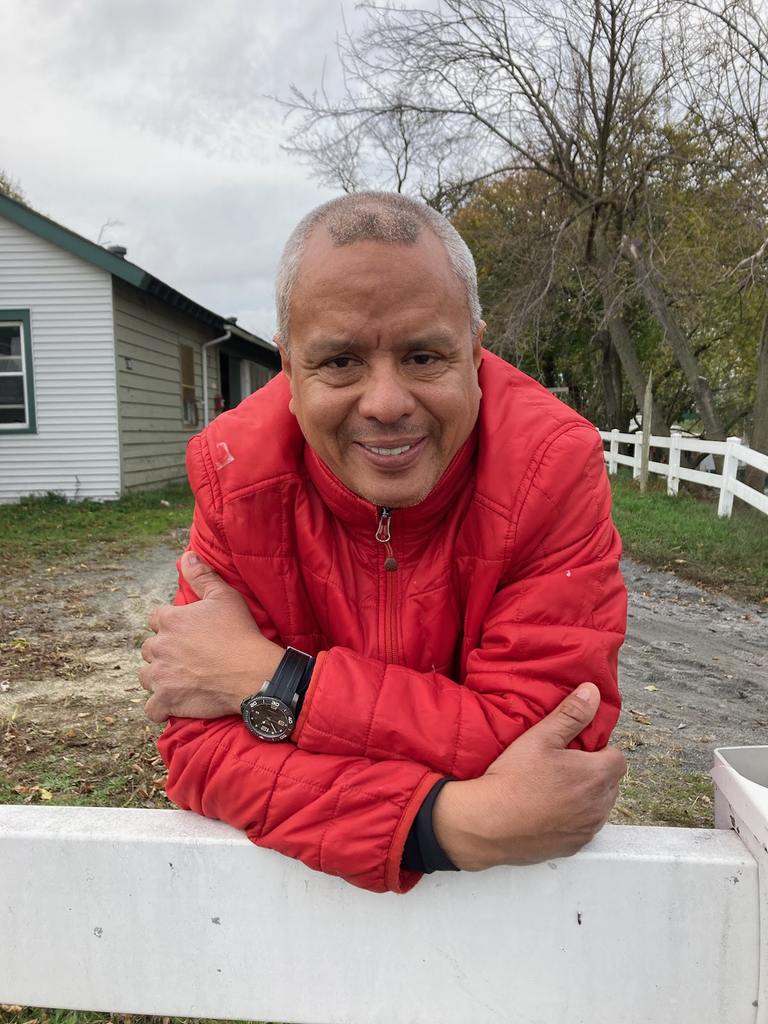
Francisco Barrera (Courtesy of NYRA)
NYRA Press Office
OZONE PARK, N.Y.— As a jockey, Francisco Barrera disciplined himself to laser-focus on the next race – “looking at what was just ahead of me,” as he put it, “and taking it one step at a time in order to do my best.”
Now, with race riding in his past and based at Belmont Park, Barrera takes a similar approach in both his wide-ranging work as an exercise rider – and what Executive Director of the Backstretch Employee Service Team (B.E.S.T.) Paul Ruchames called, “a one-man, social-service program.”
In addition to working as an exercise rider in trainer Robert Falcone, Jr.’s barn, Barrera is an assistant tutor to fellow backstretch workers for “English as a Second Language” (ESL) classes; a trained drug-and-alcohol peer advocate coach; and manager of the weekly “bistro” where members of the backstretch community go for fellowship, snacks and to connect with family on laptops.
It’s a heavy load, making the 48-year-old Lima, Peru native, who retired from race riding in 2007, a rock on Belmont Park’s backstretch as a counselor, a mentor and just a friend to colleagues in need. If someone is having a personal issue, it’s often Barrera who takes the call and then the time, always he said, “with empathy, by putting myself in their place, and careful never to judge.”
There are no designated hours for Barrera’s volunteer role. The backstretch community knows how and where to find him 24/7, even when Belmont Park is bustling during morning training. “Sometimes, I have to ask somebody to wait because I need to ride a few more horses,” he says. “But I always get to the person and see if I can help them. We’re like a family here and we share problems. I’m always available to help.
“It’s a matter of using what I learned along the way and doing what I can where I can,” continued Barrera, who, in his career as a well-traveled jockey, rode in Peru, Ecuador and Brazil; before emigrating to the U.S. to ride at Payson Park in Florida, Thistledown Race Track outside Cleveland; and for a spell in 2007, in Saratoga. “And if I can help somebody with a problem, provide some companionship or just listen, I’m happy to do it.”
Most involvements are modest, often conversations over coffee at the Bistro or, as happened several months ago, a 4:30 a.m. visit to a dorm room, when Barrera ended up driving a resident to a detox facility. In some cases, Barrera refers a person to the B.E.S.T. on-site, state-licensed drug-and-alcohol outpatient treatment program or to Chaplain Humberto Chavez at the New York division of the Race Track Chaplaincy.
While Barrera embraces the challenge, he is too modest to talk much about his contributions. Others do that for him.
“What Francisco does, day in and day out makes him a true role model,” said Ruchames. “He is very well respected. And he’s a source of hope and inspiration for many on the backstretch.”
Chaplain Chavez agreed. “Francisco is a force for good, someone with the moral compass and the time to help a colleague in need,” he said. “And he does it with such humility and grace.”
Falcone, Jr. recalled the day that Barrera begged off a request to help transport a stakes horse in order to tutor the ESL class.
“It doesn’t surprise me at all,” said Falcone, Jr. of Barrera’s community efforts. “Francisco is dependable, always shows up and does his job the right way. He cares about the horses – and I can see him doing those things on the backstretch. He’s that type of person.”
Barrera completed peer advocate training two years ago at Ruchames’ suggestion and with the help of a scholarship from the New York Thoroughbred Horsemen’s Association (NYTHA).
“It taught me how important it is to listen when talking to people about their problems,” he said. “You need to learn how to separate yourself and really hear what they’re telling you.”
Barrera called his decision to become a go-to person on the backstretch as a way of helping others face the kind of challenges he has dealt with himself. Breaking his back and forced to retire from race-riding in 2007, he returned to Peru to recover and eventually worked his way back to racing, not as a jockey but as an exercise rider.
“Doctors told me I couldn’t ride anymore, but I found I could,” said Barrera. “You have to know what to do when you get on a horse. I told myself I could still make a living in this field, which I’m doing today.”
Arriving at Belmont Park in 2008, Barrera resolved to learn English to better communicate with trainers. Enrolling in B.E.S.T.’s ESL class, he became so proficient that he began serving as assistant tutor in the twice-weekly classes, a role he continues to relish.
“Seeing the confidence that people get from learning English is really great,” said Barrera. “It helped me and I know that with a lot of hard work, it can help others.”
In February 2021, when his brother, Miguel, passed away in Peru from COVID-19, Barrera was unable to travel home for the funeral and faced the kind of isolation and loneliness for which he counsels others.
Barrera credited his wife, Amy, and their three children, Fabiana, 25; Juan, 16 and Luciana, 12, with helping him cope. And as he is apt to do in many things, Barrera has made a special effort to be a mentor to his brother’s three sons, even from a distance.
“Whether it’s my nephews, my children or someone at the track, they know me and know I’m here for them,” said Barrera. “On the backstretch, it can be any time and any issue. Or it’s just needing someone to listen. They know I’m here.”



